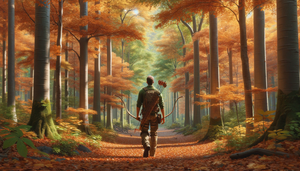Hunting Regulations in Maple Forests
Jul 08, 2024
Maple forests, renowned for their luscious syrup production, are not just sweet havens but also rich ecosystems teeming with wildlife. To maintain this delicate balance, hunting regulations have been meticulously crafted to ensure wildlife populations remain robust while preserving the serene beauty of these forests. This blog post delves into the essential hunting regulations in maple forests, offering insights to those who cherish both the taste of pure maple syrup and the conservation of nature’s bounty.
Understanding Maple Forests and Their Wildlife
Maple forests, particularly in regions like Vermont, are ecological treasures. These forests host a variety of species, including deer, moose, turkeys, and countless smaller creatures that contribute to the ecosystem's health. Protecting these wildlife populations ensures that the forests continue to thrive and provide the perfect environment for maple syrup production.
Key Hunting Regulations in Maple Forests
- Seasonal Restrictions
- Deer Hunting: Typically allowed from late October to early December, ensuring deer populations have time to recover and grow.
- Moose Hunting: Often restricted to specific periods in October to manage the population without causing significant disruption.
- Turkey Hunting is divided into spring and fall seasons, each with its own set of dates, to balance population control with breeding cycles.
- Bag Limits
- Deer: Hunters are usually limited to one deer per season, with special permits available for additional harvests.
- Moose: Strictly controlled with a lottery system to limit the number of hunters.
- Turkey: Daily and seasonal bag limits are enforced to prevent overharvesting.
- Licensing and Permits
- Hunters must obtain appropriate licenses and permits, which are often specific to the type of game and the season.
- Special permits are required for non-residents, ensuring that local populations are given priority in resource management.
- Weapon Restrictions
- Certain weapons are prohibited during specific seasons to ensure safety and ethical hunting practices. For example, only bow hunting might be allowed during early deer season.
- High-speed rifles may be restricted to specific areas to prevent accidents and overharvesting.
- Protected Areas
- Some parts of maple forests are designated as wildlife refuges where hunting is prohibited, providing safe havens for breeding and population recovery.
- Buffer zones around these areas ensure minimal human interference.
- Reporting and Monitoring
- Hunters are required to report their harvests to wildlife management authorities, which aids in monitoring and managing wildlife populations.
- Regular surveys and studies are conducted to assess the health of the wildlife and adjust regulations as needed.
Importance of These Regulations
These hunting regulations are critical for several reasons:
- Sustainability: Ensures wildlife populations are maintained at healthy levels, preventing overpopulation and starvation or underpopulation and genetic bottlenecks.
- Ecological Balance: Protects the intricate web of life within maple forests, where each species plays a crucial role.
- Economic Impact: Healthy wildlife populations attract eco-tourists and hunters alike, supporting local economies without compromising the forest's health.
- Cultural Heritage: Many communities rely on these forests for traditional practices, including maple syrup production and hunting, making sustainable management essential for preserving cultural heritage.
Tips for Hunters
- Stay Informed: Always check the latest regulations before heading out, as they can change based on wildlife population studies.
- Respect the Forest: Follow the leave-no-trace principles to minimize your environmental impact.
- Be Safe: Wear appropriate gear, follow weapon safety guidelines, and ensure you are visible to other hunters.
Frequently Asked Questions (FAQs)
Q: Can I hunt in maple forests year-round? A: No, hunting seasons are strictly regulated to protect wildlife populations. Always check the specific dates for each type of game.
Q: How do I obtain a hunting license? A: Hunting licenses can be obtained through state wildlife agencies. Requirements vary by state, so be sure to check local regulations.
Q: Are there specific areas within maple forests where hunting is prohibited? A: Certain areas are designated as wildlife refuges where hunting is not allowed to protect breeding grounds and habitats.
Q: What should I do if I accidentally enter a protected area? A: Leave the area immediately and report the incident to local wildlife authorities to avoid penalties and contribute to conservation efforts.


